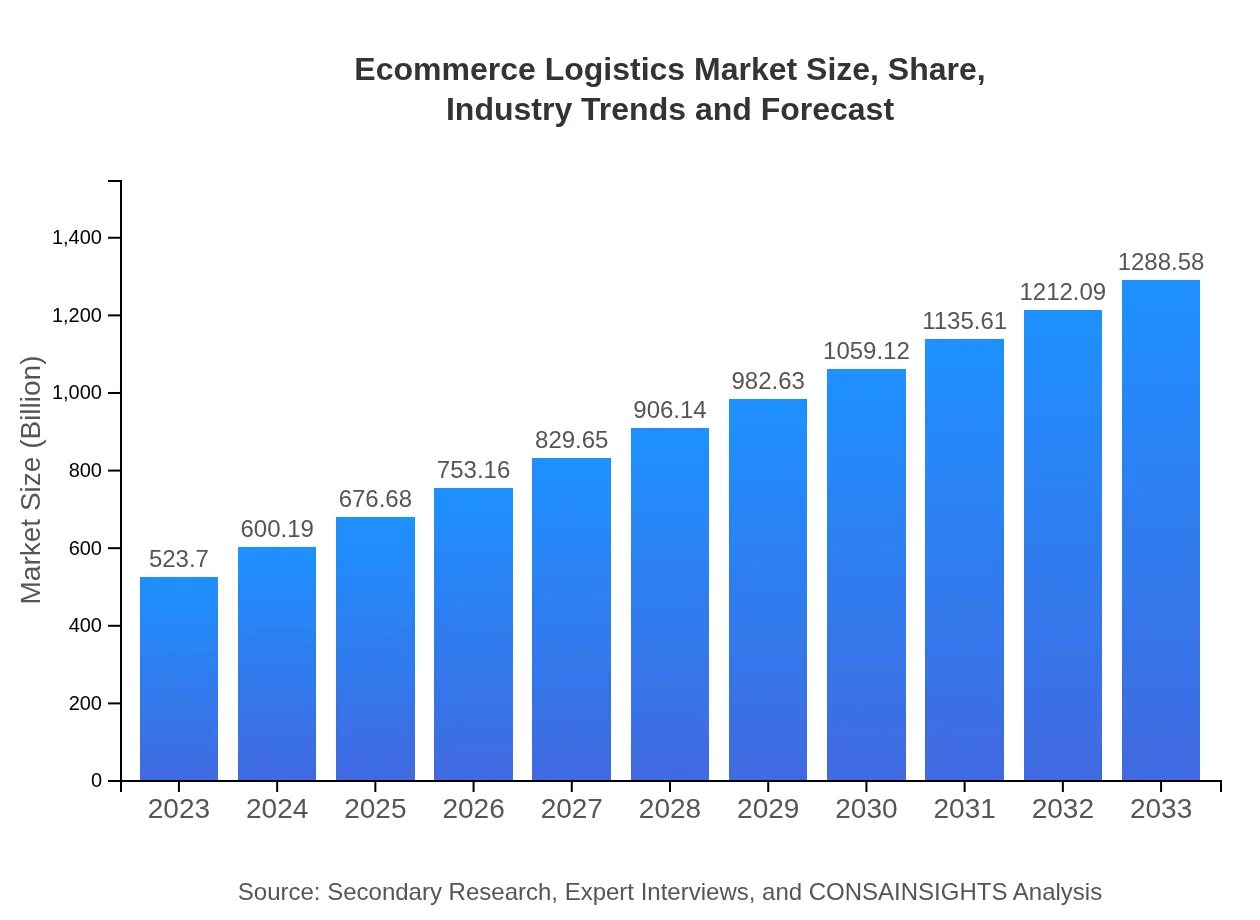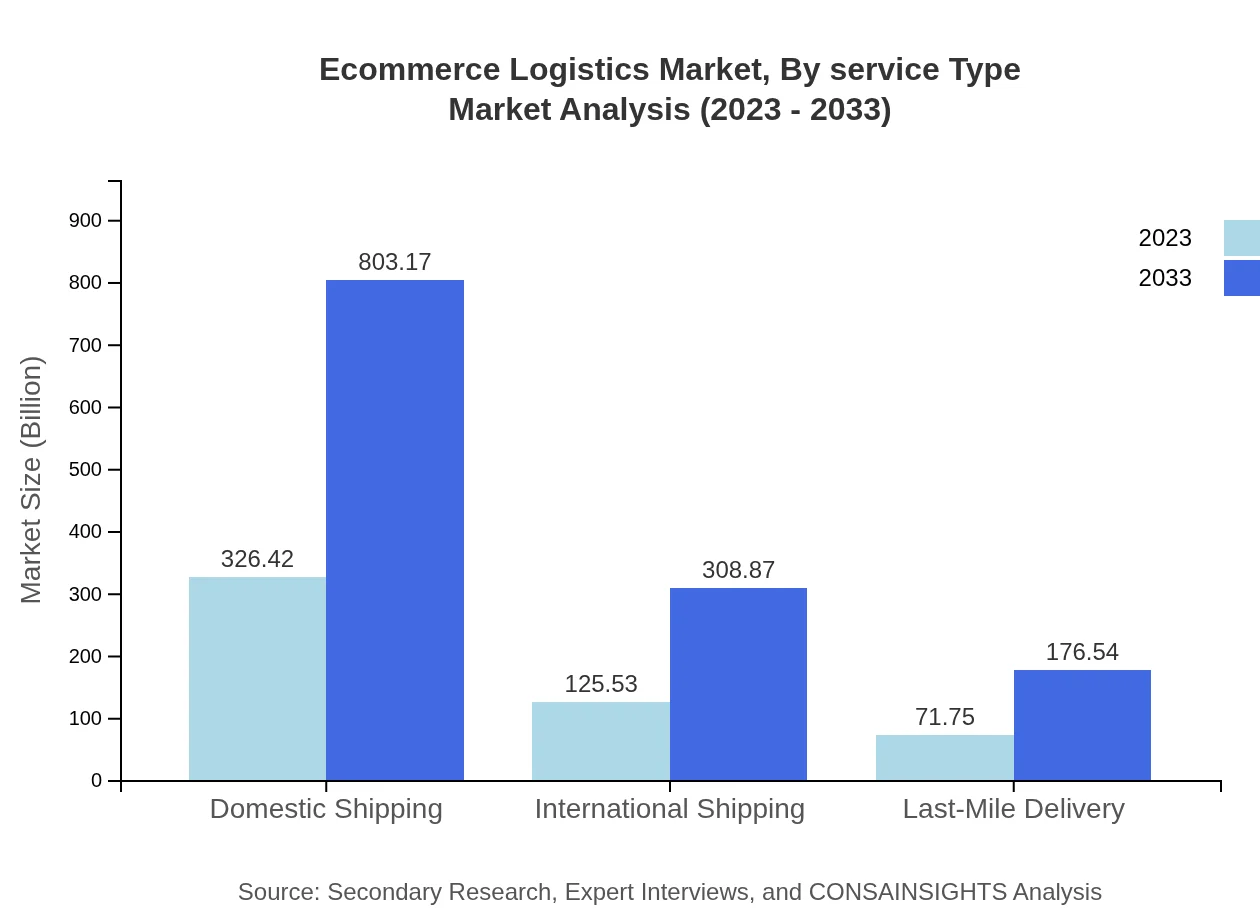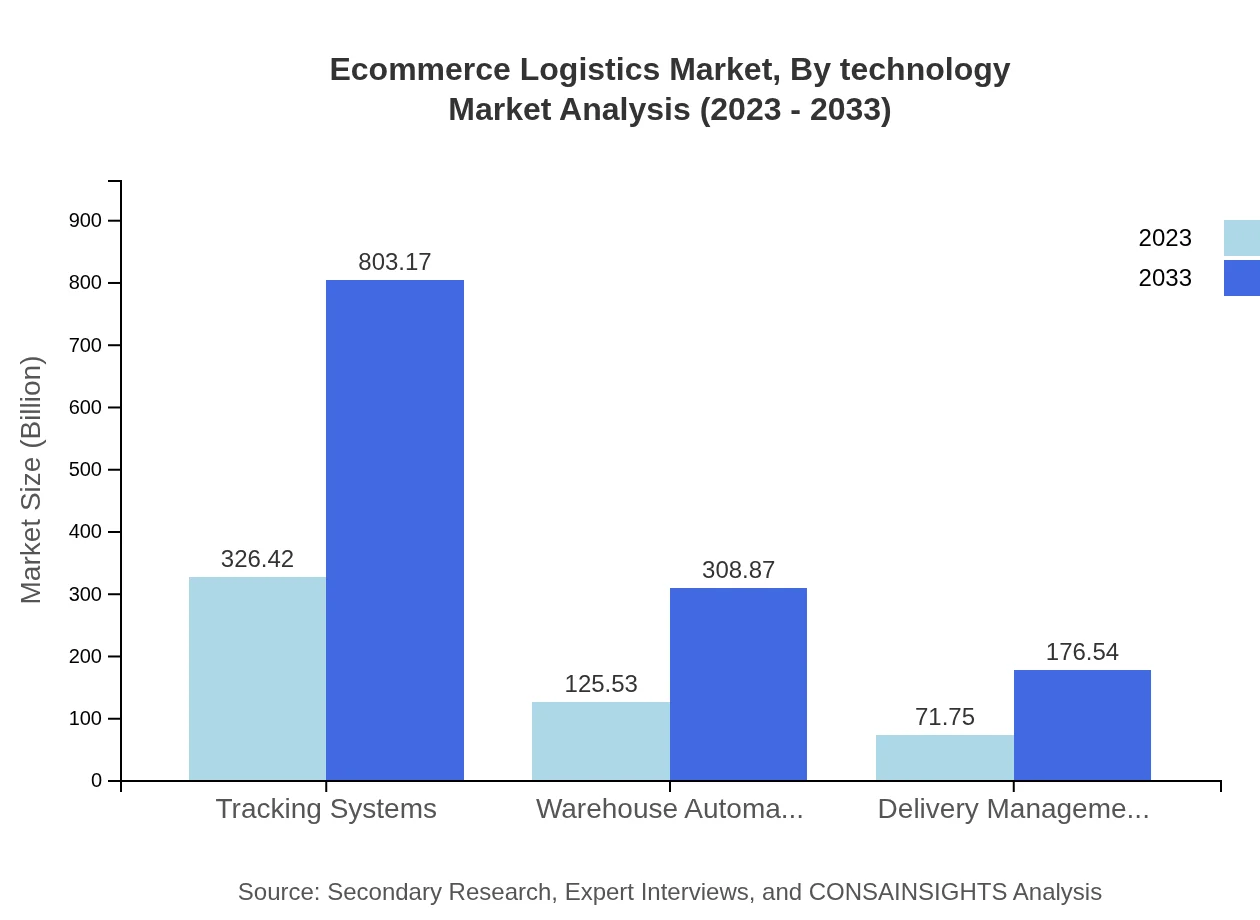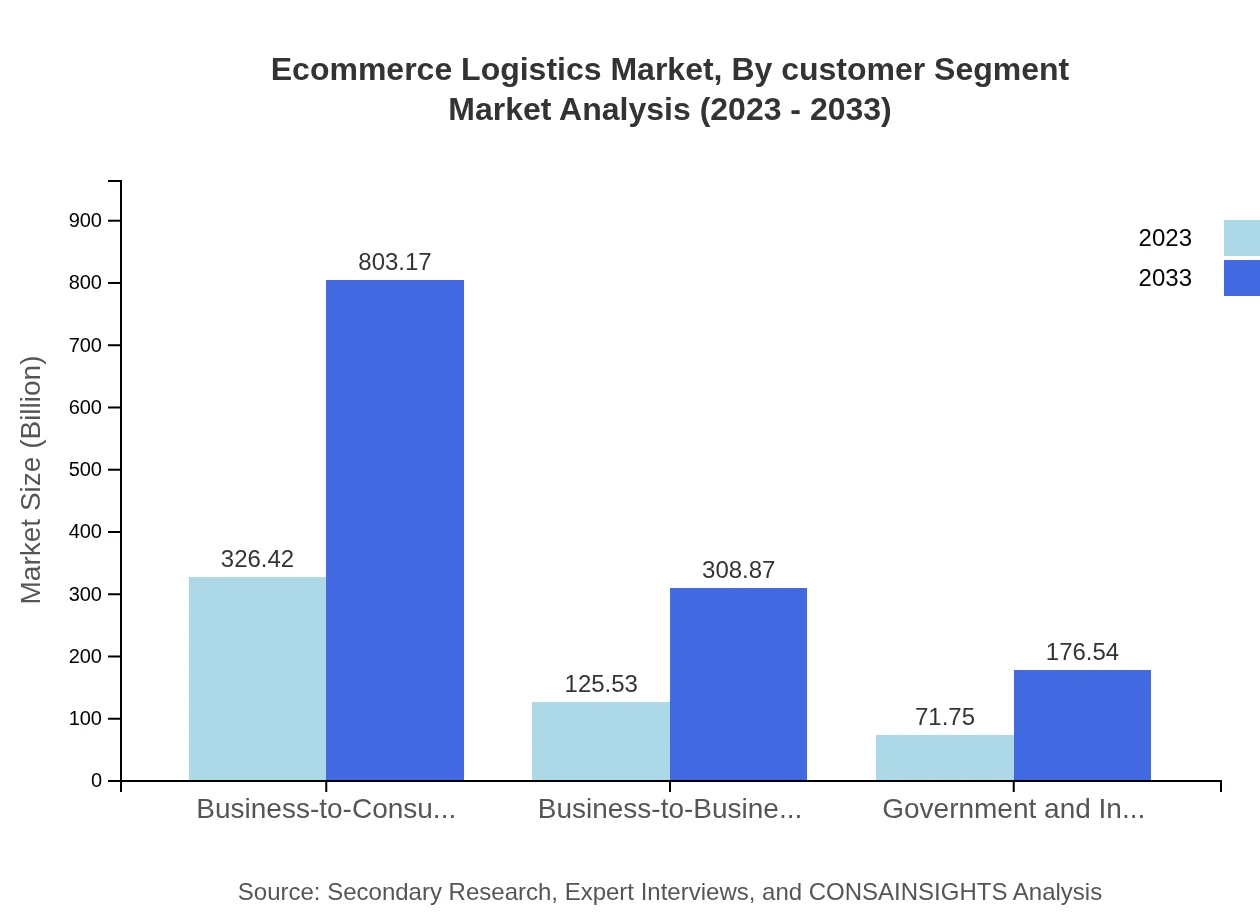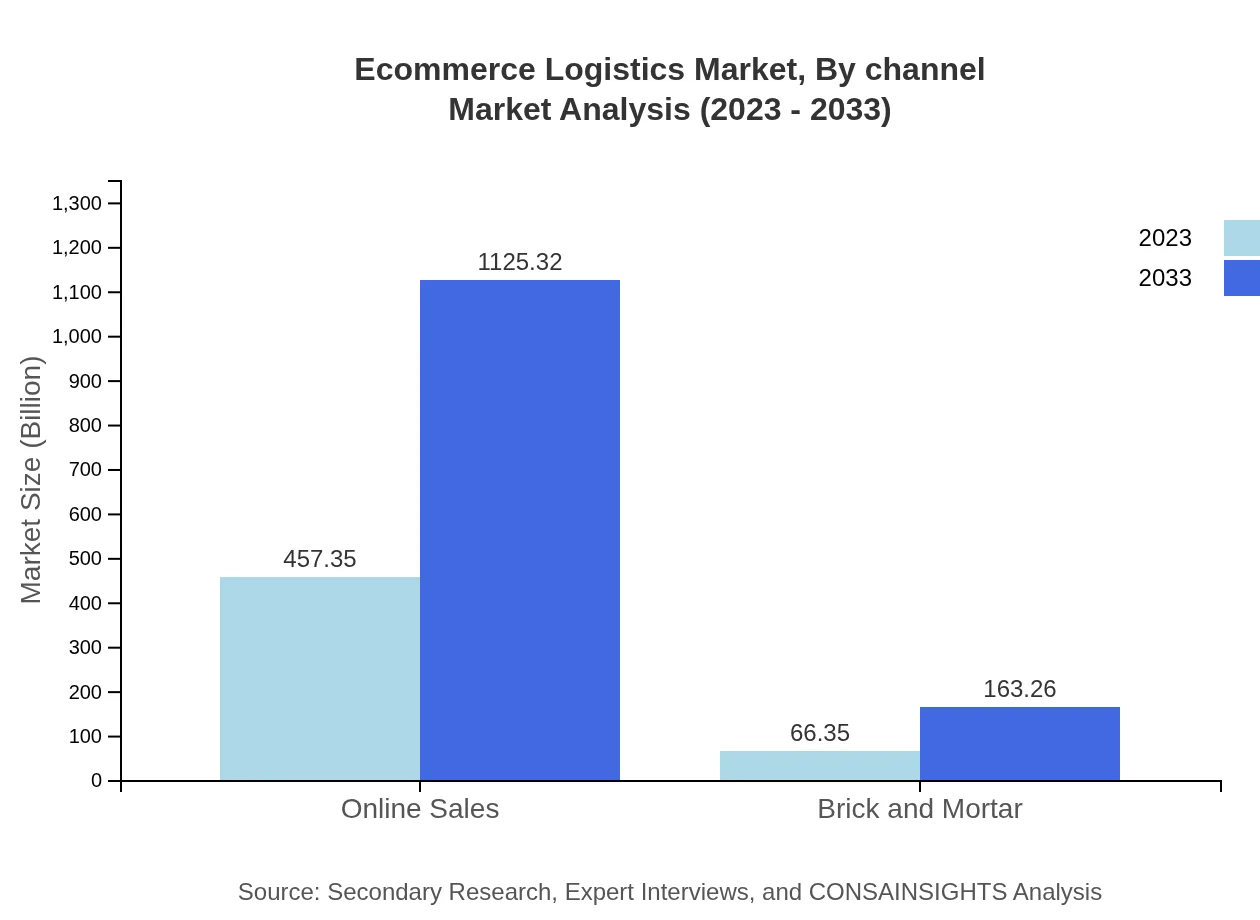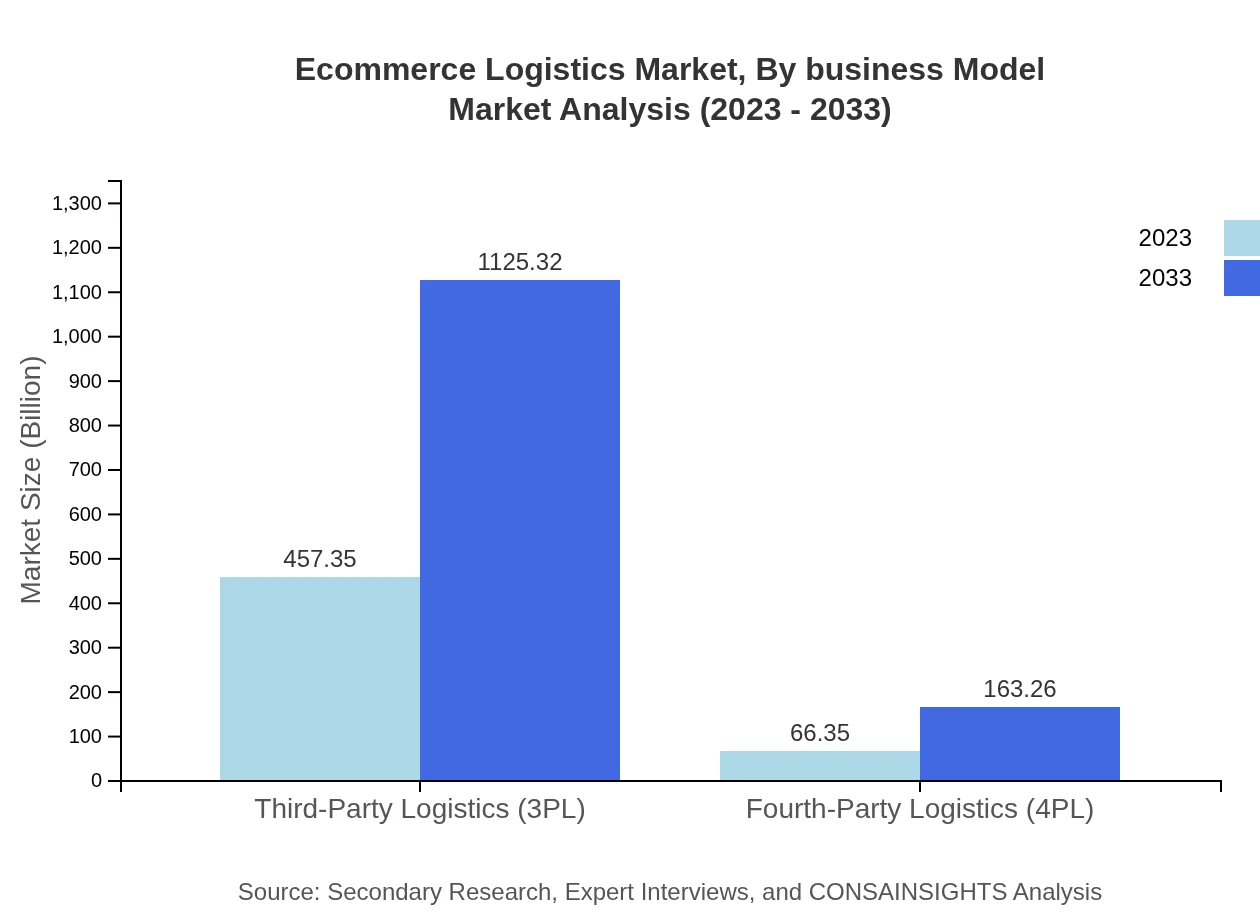Ecommerce Logistics Market Report
Published Date: 31 January 2026 | Report Code: ecommerce-logistics
Ecommerce Logistics Market Size, Share, Industry Trends and Forecast to 2033
This report provides a comprehensive analysis of the Ecommerce Logistics market, highlighting insights, trends, and forecasts from 2023 to 2033. It covers market size, industry dynamics, segmentation, regional analysis, and the impact of technology on logistics operations.
| Metric | Value |
|---|---|
| Study Period | 2023 - 2033 |
| 2023 Market Size | $523.70 Billion |
| CAGR (2023-2033) | 9.1% |
| 2033 Market Size | $1288.58 Billion |
| Top Companies | Amazon Logistics, DHL Supply Chain, FedEx , UPS, XPO Logistics |
| Last Modified Date | 31 January 2026 |
Ecommerce Logistics Market Overview
Customize Ecommerce Logistics Market Report market research report
- ✔ Get in-depth analysis of Ecommerce Logistics market size, growth, and forecasts.
- ✔ Understand Ecommerce Logistics's regional dynamics and industry-specific trends.
- ✔ Identify potential applications, end-user demand, and growth segments in Ecommerce Logistics
What is the Market Size & CAGR of Ecommerce Logistics market in 2023?
Ecommerce Logistics Industry Analysis
Ecommerce Logistics Market Segmentation and Scope
Tell us your focus area and get a customized research report.
Ecommerce Logistics Market Analysis Report by Region
Europe Ecommerce Logistics Market Report:
In Europe, the market is valued at $154.23 billion in 2023, expected to surge to $379.49 billion by 2033. Increased cross-border e-commerce activities and demands for faster shipping options contribute significantly to market growth.Asia Pacific Ecommerce Logistics Market Report:
In 2023, the Ecommerce Logistics market in Asia Pacific is valued at approximately $97.15 billion and is projected to reach $239.03 billion by 2033. The region's growth is fueled by robust internet penetration, a burgeoning middle class, and the dominance of mobile commerce.North America Ecommerce Logistics Market Report:
North America leads the Ecommerce Logistics market with a valuation of $194.19 billion in 2023, reaching $477.81 billion by 2033. The market is boosted by high consumer spending, advanced logistics technologies, and significant investments in supply chain optimization.South America Ecommerce Logistics Market Report:
The South American Ecommerce Logistics market stands at $24.61 billion in 2023, anticipated to grow to $60.56 billion by 2033. Increased acceptance of e-commerce platforms and investments in logistics infrastructure are key growth drivers.Middle East & Africa Ecommerce Logistics Market Report:
The Middle East and Africa market is valued at $53.52 billion in 2023 with projections of reaching $131.69 billion by 2033. Growth is supported by improved logistics networks and rising e-commerce adoption among consumers.Tell us your focus area and get a customized research report.
Ecommerce Logistics Market Analysis By Service Type
The Ecommerce Logistics market is heavily reliant on service types like third-party logistics (3PL) and fourth-party logistics (4PL). As of 2023, the 3PL segment represents a market size of $457.35 billion, growing to $1,125.32 billion by 2033. In contrast, the 4PL segment is smaller, valued at $66.35 billion in 2023 and expected to reach $163.26 billion by 2033.
Ecommerce Logistics Market Analysis By Technology
Technological advancements are integral to improving efficiency in Ecommerce Logistics. Notably, tracking systems alone account for a market size of $326.42 billion in 2023, projected to rise to $803.17 billion by 2033. Warehouse automation is another key technology, valued at $125.53 billion in 2023 and anticipated to grow to $308.87 billion by 2033.
Ecommerce Logistics Market Analysis By Customer Segment
The B2C segment dominates the Ecommerce Logistics market, valued at $326.42 billion in 2023 and expected to reach $803.17 billion by 2033. In comparison, the B2B segment is valued at $125.53 billion in 2023 and projected to grow to $308.87 billion by 2033.
Ecommerce Logistics Market Analysis By Channel
Online sales continue to be the leading channel for Ecommerce Logistics, accounting for $457.35 billion in market size in 2023, forecasted to reach $1,125.32 billion by 2033. Brick and mortar sales trails behind, valued at $66.35 billion in 2023 and projected to grow to $163.26 billion by 2033.
Ecommerce Logistics Market Analysis By Business Model
The direct sales model is primarily responsible for the growth in the Ecommerce Logistics space, emphasizing the critical role of efficient logistics in consumer satisfaction. Other models like marketplace sales are witnessing growth but on a smaller scale.
Ecommerce Logistics Market Trends and Future Forecast
Tell us your focus area and get a customized research report.
Global Market Leaders and Top Companies in Ecommerce Logistics Industry
Amazon Logistics:
Amazon’s logistics arm is known for its advanced fulfillment services and extensive delivery network, which enhances customer satisfaction and speeds up delivery times.DHL Supply Chain:
A global leader in logistics, DHL offers expansive solutions that integrate logistics, warehousing, and transportation services, catering to various industry needs.FedEx :
FedEx focuses on fast and flexible delivery options, providing reliable domestic and international shipping services with a strong technological backbone.UPS:
UPS is recognized for its vast logistics network and technology-driven solutions that improve delivery efficiency and supply chain visibility.XPO Logistics:
XPO Logistics is known for its innovative supply chain solutions and strong e-commerce capabilities, helping businesses optimize their logistics operations.We're grateful to work with incredible clients.









FAQs
What is the market size of ecommerce Logistics?
The ecommerce logistics market is projected to reach $523.7 billion by 2033, growing at a CAGR of 9.1%. The increasing demand for online shopping is a significant driver of this growth.
What are the key market players or companies in this ecommerce Logistics industry?
Leading companies in the ecommerce logistics industry include Amazon Logistics, FedEx, UPS, DHL, and XPO Logistics, providing services across various segments such as warehousing, shipping, and last-mile delivery.
What are the primary factors driving the growth in the ecommerce Logistics industry?
Key factors driving growth include the rise of online shopping, technological advancements in logistics, increased consumer demand for fast delivery, and the growing adoption of innovative logistics solutions, such as automation and tracking systems.
Which region is the fastest Growing in the ecommerce Logistics?
The Asia Pacific region is expected to experience significant growth in the ecommerce logistics market, expanding from $97.15 billion in 2023 to $239.03 billion by 2033, driven by increasing internet penetration and rising ecommerce activities.
Does ConsaInsights provide customized market report data for the ecommerce Logistics industry?
Yes, ConsaInsights offers customized market report data tailored to specific client needs in the ecommerce logistics sector, ensuring relevant insights based on unique requirements and market dynamics.
What deliverables can I expect from this ecommerce Logistics market research project?
Clients can expect a comprehensive market analysis report, including detailed market size forecasts, segmentation data, competitive landscape assessments, regional insights, and actionable recommendations tailored to strategic planning.
What are the market trends of ecommerce Logistics?
Current trends in the ecommerce logistics market include the rise of omnichannel fulfillment, increasing investments in warehouse automation, the emergence of sustainable logistics practices, and advancements in analytics for improved efficiency.

